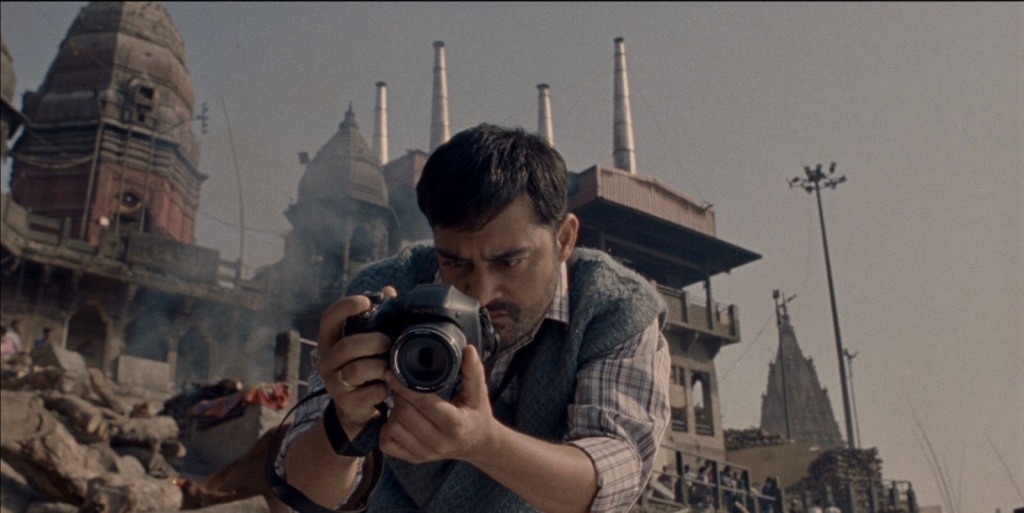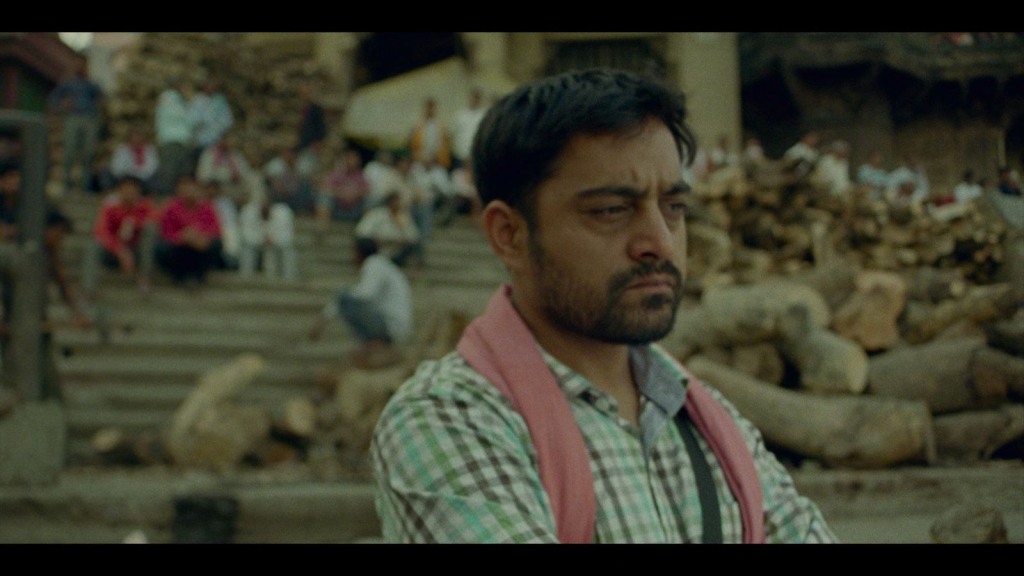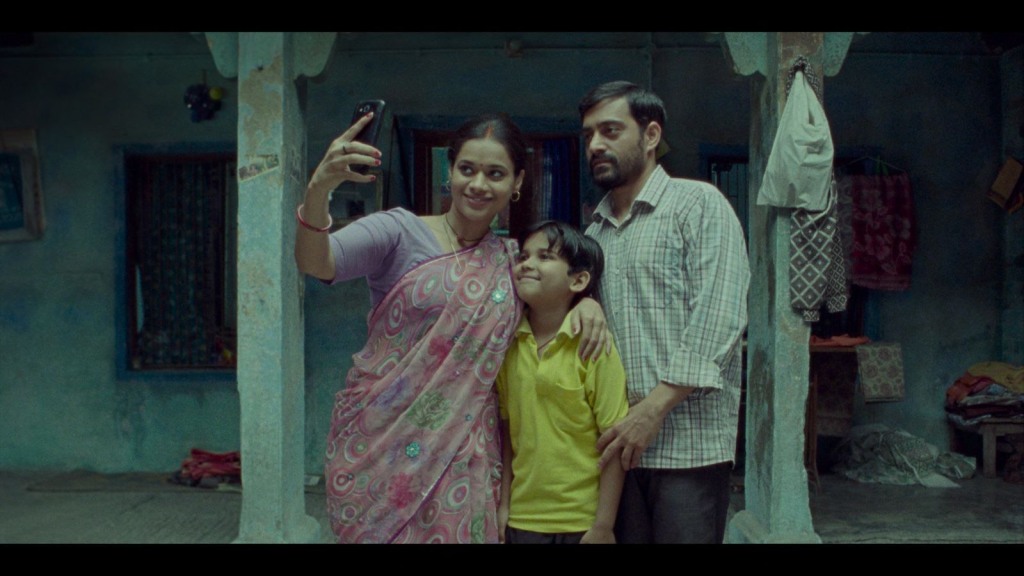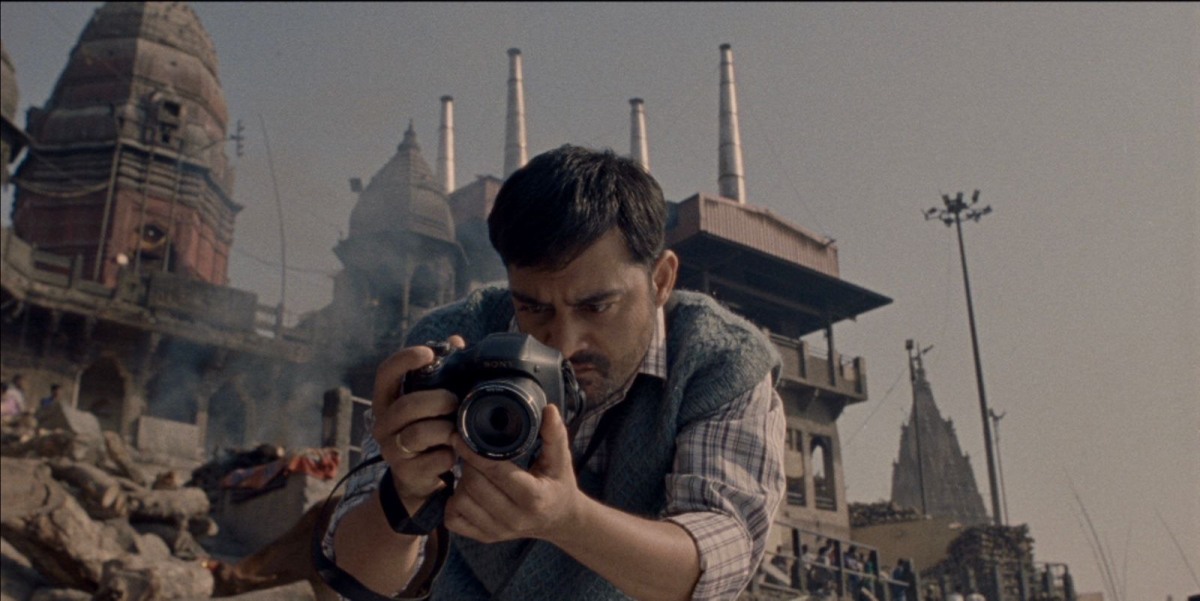Writer Sunny Lahiri and director Gaurav Madan’s film has a real-life feel to it but is hardly engaging. Gyanendra Tripathi, Bhumika Dube, and Geetika Vidya Ohlyan deliver sincere performances.
Rating: ⭐️⭐️ ( 2 / 5)

By Mayur Lookhar
One is a creation of the environment in which they are raised. Each time we say this, don’t we tend to paint a certain picture of that environment? So, is Varanasi all about ghats, pyres, and mukti dhams? Yours truly has never been to Banaras or Varanasi, but those familiar with the city dispel this cinematic notion about the holy town in Uttar Pradesh.
Sooraj’s [Gyanendra Tripathi] world is largely based around these ghats. He makes his living by capturing the dead and perhaps helps carry on the family tradition by shaving the heads of the deceased’s kin. He chose photography, yet there is a mundaneness on his face. His father’s ill health, dwindling income, and rising costs have all contributed to this phase. Sooraj looks like a man carrying the weight of the world on his shoulders. He doesn’t have answers, seems resigned to fate, but he isn’t prepared to give up his life of capturing the dead.
Not many would fancy such a life, especially urbanites. Sitting far away in the concrete city jungles, one might wonder if this is what life in Varanasi is really like. Can an average viewer then be drawn to Barah By Barah (2024)? Writer Sunny Lahiri and director Gaurav Madan’s film has a real-life feel to it. We’re not fond of Bollywood masalas; not every film ought to be entertaining, but it should be engaging. Barah By Barah, though, fails to build much engagement.
Its content, narrative, and style are befitting for a festival screening. The film has traveled to a few, including the Shanghai International Film Festival. One doesn’t know about the ground response there, but the first half feels like a snooze fest. It’s slow, dull even for a slow-burn. With barely any dialogue, the film relies on its atmospherics and the expressions—rather, the lack thereof—of its leading character. It’s not that Tripathi is below par; it’s the script that asks viewers to simply feel the internal turmoil of Sooraj. The prolonged silence threatens to lull you to sleep, and for once, you don’t mind the hushed whispers in the cinema hall.

The chapter-based narrative reads something like The Barber, The Friend, The Son, The Wife,’ and culminates with ‘The Last Photograph.’ For the most part, a viewer struggles to find a strong, engaging story. Things become clear in the last 45 minutes. While the narrative may not be engaging, one can relate to the state of mind of Sooraj. How often do we find ourselves trapped in monotony, failing to recognize that life quietly yearns for a change—not necessarily in our profession, but in our environment.
A Barah By Barah also reflects life during a period of transition in a place like Varanasi. Director Madan cleverly weaves in political promises and structural changes that are part of this phase, while the cultural references largely remain untouched along the riverbanks.

Amidst the subdued tension, what’s likable is the relationship between Sooraj and Meena. The couple epitomizes successful marriages in these land, even though patriarchy rules here. Sooraj doesn’t hesitate to tell Meena [Bhumika Dube] not to overthink, yet deep down, he knows his wife has the best interests of the family at heart. Tripathi skillfully portrays Sooraj’s internal turmoil. Although a man of few words, he indulges in a bit of chivalry, capturing candid pictures of his wife and praising her beauty. ‘Arey kahan tum Indore ki rani, is mashaalo ke shaher main phas gayi,’ he playfully remarks. The aesthetically shot intimate scenes convey genuine passion. However, the most gripping intimate moment occurs after a tragedy, when Meena takes it upon herself to uplift her bereaved husband’s mood. The Sooraj-Meena small-town chemistry is sure to inspire couple goals.
Not merely a cameo, Geetika Vidya Ohlyan brilliantly portrays Mansi, the younger sister of Sooraj, who works at the Delhi Metro Rail Corporation Limited. The dynamic between Mansi and Meena stands in stark contrast to typical squabbling sister-in-law relationships. Geetika’s performance is particularly impressive in the emotional scenes.
Barah By Barah (12 by 12) is a fitting title for a photographer’s story. However, the film yearns for a better screenplay, direction. Madan and Sunny Lahiri have remained true to their story and culture, but a theatrical release demands treatment that can captivate audiences in cinema halls. Unfortunately, most theaters are operating at limited capacity. While Barah By Barah might appeal to art film connoisseurs, it’s unlikely to put bums on empty seats. And that is the need of the hour.
The film is scheduled for release in theaters on 24 May.


![Priyanka Chopra, Nick Jonas spend a lazy Sunday at the beach with Malti Marie Chopra; gets trolled again for hiding baby’s face [View Pics]](https://st1.bollywoodlife.com/wp-content/uploads/2023/01/MicrosoftTeams-image-692-600x315-1.jpg)
![Maya and Anuj are Chhoti Anu’s biological parents? MaAn fans hope the upcoming track is NOT about AK vs Anu [VIEW TWEETS]](https://st1.bollywoodlife.com/wp-content/uploads/2023/01/Anupamaa-2023-01-21T091525.329-600x315.png)









